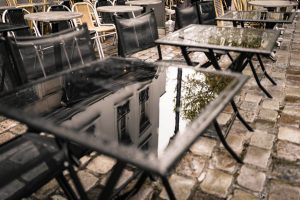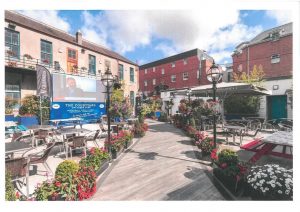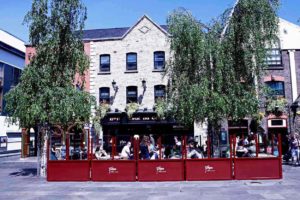Innovation needed in offering public spaces to bars & cafés

Local councils around the country might consider the possibility of easing up on outdoor seating and tables regulations to help with the new social distancing requirements in pubs and restaurants.
Perhaps they could take an example from the Lithuanian capital of Vilnius whose town council has given over 18 public spaces for the setting up of bars and cafés to permit the extension of social distancing measures beyond the premises’ footprint as part of a phased exit from lockdown there.
The move allows bar and restaurant proprietors to place tables and chairs outdoors but in observance with the strict social distancing rules and other safety precautions.
According to a report, published recently in the UK’s Guardian newspaper, “Shops must limit the number of customers at one time, masks will remain mandatory in all public spaces and café and restaurant tables have to be placed at least two metres apart.
“That posed a problem for many restaurateurs in Vilnius old town, Senamiestis, a Unesco-listed world heritage site whose narrow streets make it almost impossible to place more than a couple of tables outside.”
This prompted an offer from the Mayor of Vilnius Remigijus Šimašius.
“‘Plazas, squares, streets – nearby cafés will be allowed to set up outdoor tables free-of-charge this season and thus conduct their activities during quarantine,’ he said, adding that public safety remained the city’s top priority.”
However the measure should help cafés to “open up, work, retain jobs and keep Vilnius alive”.
According to the Guardian, “Eighteen of the city’s public spaces, including its central Cathedral Square, have been opened up for outdoor cafés and restaurants, City Hall said and more are expected to be added as the Summer progresses. The move has been welcomed by owners, with more than 160 applying to take up the offer.”
The gesture has also been welcomed by the Lithuanian Association of Hotels & Restaurants as it will help their members “accommodate more visitors and bring life back to the city streets” but without violating security requirements.
“It came just in time,” declared the Association’s Evalda Šiškauskienė.
And in another hospitality-friendly move, the Vilnius authorities have given the city’s public health workers €400,000-worth of restaurant vouchers as a gesture of thanks for their work and as a much-needed boost for the city’s hospitality sector.
To date, the Baltic state has recorded 1,547 cases of the coronavirus with 59 deaths.
Here in Ireland it might be one means of local authorities helping get its hospitality industry back on its feet for what will remain of the Summer – and even that depends on what kind of Summer we get.
“The extension of tables and chairs onto streets is great if we get the sunshine,” the Vintners Federation of Ireland’s Chief Executive Padraig Cribben told Drinks Industry Ireland, “But transporting European solutions to wet and windy Ireland will not always work.”
Dublin

Dublin City Council is reviewing its regulation on outdoor seating to take account of social distancing guidelines for both restaurants and pedestrians.
In Dublin no discussions appear to have taken place with Dublin City Council and Dublin publicans according to Donall O’Keeffe, Chief Executive of the Licensed Vintners Association, who has seen some media coverage that it’s planning to make more use of pedestrianising streets and considering the situation in regard to street furniture.
“We welcome that,” he told Drinks Industry Ireland, “Balancing pedestrian access with the ability of business to generate turnover while adding to the ambiance of the city is a winner for all concerned.”
However, the City Council has denied reports that far from increasing the amount of seating space, it has decided to go in the other direction and reduce this, stating that it is reviewing its regulation on outdoor seating to take account of social distancing guidelines for both restaurants and pedestrians.
Should Dublin City Council reduce the amount of street furniture permitted outside hospitality outlets, the LVA would expect street furniture fees to fall commensurately.
And if the Council is considering a reduction in tables and chairs, the Restaurants Association of Ireland’s Chief Executive Adrian Cummins has stated that Dublin City Council needs to “cop on” and “think outside the box.
“Everybody must be in this together but from what I can see here, Dublin City Council aren’t in this together with the entire country,” he stated recently.
In response to questions put to it by Drinks Industry Ireland, Dublin City Council stated that it was not true that it intends to reduce rather than increase the amount of space to be given over for tables & chairs outside premises.
A spokesman for Dublin City Council stated that it is committed to assisting restaurants, pubs, cafés etc “within the regulatory framework that exists regarding the licensing of street furniture”.
Furthermore he told Drinks Industry Ireland, “Dublin City Council will issue ‘credits’ to street furniture licence-holders in respect of the period when the street furniture was not being used”.
He added that the Council is “prepared to consider proposals from restaurants, pubs etc who are rates-compliant, for greater use of the public realm to compensate for the impact of social distancing on their businesses.
“However the Council’s first priority will be to increase footpath widths to protect pedestrians so any additional space is likely to come from the suppression of on-street parking at locations where there is parking adjacent to the particular premises, from the closure of roads or elsewhere in the public domain.”
But in what could be taken as a message to the pub trade in Dublin the spokesman warned, “Whatever about facilitating tables and chairs in the public domain for seated patrons, it is most unlikely that the City Council will agree to the allocation of public space to facilitate the consumption of alcohol on its own in the public domain. There are also important health and safety and fire safety matters to be considered.”
And he concluded, “In relation to fees, part of the fee is statutory and must be applied. There may be some discretion in relation to the non-statutory element and this can be discussed”.
Cork

Cork City Council is working with various stakeholders on plans to have bike lanes and car parking spaces used to allow the hospitality trade increase capacity while better socially spacing their customers by permitting overspill into the streetscape when – and if – health restrictions are lifted.
In Cork, such plans appear to be at a more advanced stage with the local hospitality trade there. Cork City Council has agreed in principle with the idea of expanding the footprint of the city’s hospitality business beyond that of the premises and wants to be really supportive of businesses trying to get back on their feet when they do re-open.
It’s therefore working with various stakeholders on plans to have bike lanes and car parking spaces used to allow the hospitality trade increase capacity while better socially spacing their customers by permitting overspill into the streetscape when – and if – health restrictions are lifted.
The Council has been subject to many requests of this nature and has been working with these businesses on a street-by-street basis, encouraging them to talk to their neighbouring businesses – all of which has led to traders in Cork’s Princess Street putting in a proposal as to how the street could be re-imagined post-Covid-19.
A meeting of the CORE group of stakeholders, including Cork Chamber, Cork Business Association, An Garda Síochána and Bus Éireann as well as representatives from the city’s retail and hospitality sector took place recently at which plans were further discussed.
“The Council first needs to do a grid-map and examine how the hospitality industry might expand onto the street where possible,” Lawrence Owen, Chief Executive of the Cork Business Association, explained to Drinks Industry Ireland, “It needs to identify areas which are open to this – and every street will be different in terms of size, width etc as well as one’s neighbour’s needs.
“There’s a body of work that needs to be done,” he said, “It’s the involvement of the businesses themselves that will be critical, that it will work for everyone.
“What we’ve done in the past has to change. None of us have a reference book for Covid-19 but we must try to engage with businesses who know best and use the guidelines in the Roadmap and the protocols – but these are not sector specific, which we are waiting on.
“There’s also the question of a queueing system within the streetscape which needs to be regulated for by Government,” he added, “Otherwise it’s a recipe for chaos.
“The proposal was put through CORE suggesting that additional chairs would be welcome on the streetscape provided it’s done right and so far, the Council has suggested that there would be no additional charge for extra space given over.
“The key point in this is that you need to have absolutely comprehensive meaningful engagement with the businesses, listen to them on their hopes and fears and develop a strategy together for tackling the problems.”
Galway, Wexford & Kerry

Galway City Councillor Alan Cheevers has called for the city’s outdoor licence fee to be waived for bars, cafés and restaurants to the end of the year.
Elsewhere, Galway City Councillor Alan Cheevers has called for the city’s outdoor licence fee to be waived for bars, cafés and restaurants to the end of the year. Waiving the licence fee would be a vital leg-up for businesses as they return to work, he said.
Wexford District Council is also looking at allowing pubs, restaurants and cafés extend tables and chairs onto the street.
In Kerry, the Mayor of Tralee Councillor Jim Finucane has stated that he’d be in favour of allowing Tralee’s Mall and the Square to be used by existing rate-payers to put up a free-standing canopy, free of cost and allow council officials and engineers to help them with a seat plan or seat layout to give them a stand that they didn’t think possible before. The move might serve as a turning point for these retailers and help them to go ahead and open their business, the said.
Fianna Fáil’s Spokesperson for Transport Tourism and Sport Marc MacSharry also believes that licensing fees for outdoor furniture and seating should be waived by councils, stating that restaurants and bars should be permitted to use whatever outdoor space they have to the front and rear of their premises.
According to a recent report in Journal.ie, “MacSharry said it needs only to be a temporary policy, stating that in the Summer months, weather permitting, it would give businesses the additional capacity needed to increase the number of customers.
“The Sligo TD added that the government’s plan for the hospitality sector is ‘not fit for purpose’.
“He also argued that consideration should be given to lift restrictions in towns and villages where there are no or very few Covid-19 cases. ‘A small number of pilot schemes around the country should be launched,’ he said.”
The Business Minister Heather Humpreys too believes that businesses should be able to make use of whatever outdoor space they might have to increase their capacity to compensate for interior space lost.
And in NI, Hospitality Ulster believes that such outdoor spaces should be given over to hospitality businesses to help make them sustainable under social distancing measures. Hospitality Ulster Chief Executive Colin Neill is calling for flexibility from Government and Councils and is in favour of pedestrianisation of certain streets in Belfast.
He has suggested that public spaces for consideration should include roads and even multi-storey car parks.
Everyone, it seems, is going to have to be more inventive in their response to this pandemic – publicans, restaurateurs, café owners and not least, local rural and city councils – if each of these entities is to have some kind of a future together.

Everyone, it seems, is going to have to be more inventive in their response to this pandemic – publicans, restaurateurs, café owners and not least, local rural and city councils – if each of these entities is to have some kind of a future together.








